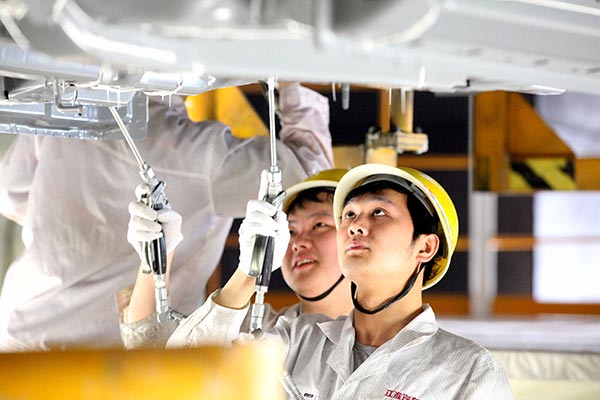Reforms to build a xiaokang society in China
Updated: 2016-03-04 08:07
By BERT HOFMAN(China Daily)
|
||||||||
 |
|
Workers at the production line of Anhui Jianghuai Automobile Co Ltd in Hefei, capital of Anhui province. [LIU QINLI / FOR CHINA DAILY] |
China aims to build a xiaokang (moderately prosperous) society in a comprehensive manner and eliminate extreme poverty by the end of the 13th Five-Year Plan (2016-20) period. The reforms laid out in the Suggestions of the Fifth Plenum of the 18th Communist Party of China Central Committee and Decisions of the Third Plenum provide the solid basis for achieving these objectives. The 13th Five-Year Plan, to be discussed in the coming days, will include the concrete reforms that China decides to pursue in the years ahead.
Here are some reflections on how some of those reforms could help achieve China's objectives.
First is achieving moderately rapid growth during the 13th Five-Year Plan.
Though China's GDP growth is likely to slow further from 2016-20, the World Bank projects that continued implementation of reforms would keep growth high enough to achieve the targeted doubling of GDP between 2010 and 2020. Growth projections are not exact, and if there is to be any indicative growth target for the 13th Five-Year Plan, presenting a range rather than a point would provide policymakers the space to balance reforms and demand management.
People's welfare is likely to improve more rapidly than GDP growth. In recent years, wages grew 3 percent faster than GDP. Furthermore, China's labor force is now shrinking and growth is shifting to more labor-intensive services. As a result, less growth is needed to create the jobs that can boost people's livelihoods.
Second is policy and institutional reforms to increase productivity and innovation.
Since 1978, China has boosted productivity through policy and institutional reforms that decentralized decisions and opened up the economy. The Third Plenum called for a decisive role of the market in resource allocation, and the 13th Five-Year Plan period offers the opportunity to build the institutions needed for that role. Key institutional reforms that can drive productivity and innovation are those that increase competition, improve the management of State-owned enterprises, better protect intellectual property rights and raise labor mobility.
Competition is an important driver of productivity and innovation in a market economy. China has recently enhanced competition by reducing administrative burdens for start-ups, which sparked a wave of new businesses. To further increase competition, China could establish a negative list of sectors reserved for State investment and gradually shorten that list. Moreover, other countries have found that an agency solely dedicated to the enforcement of competition policy is beneficial for competition, productivity and innovation.
- Global health entering new era: WHO chief
- Brazil's planning minister steps aside after recordings revelation
- Vietnam, US adopt joint statement on advancing comprehensive partnership
- European border closures 'inhumane': UN refugee agency
- Japan's foreign minister calls A-bombings extremely regrettable
- Fukushima impact unprecedented for oceans: US expert

 Stars of Lijiang River: Elderly brothers with white beards
Stars of Lijiang River: Elderly brothers with white beards
 Wealthy Chinese children paying money to learn British manners
Wealthy Chinese children paying money to learn British manners
 Military-style wedding: Fighter jets, grooms in dashing uniforms
Military-style wedding: Fighter jets, grooms in dashing uniforms
 Striking photos around the world: May 16 - May 22
Striking photos around the world: May 16 - May 22
 Robots help elderly in nursing home in east China
Robots help elderly in nursing home in east China
 Hanging in the air: Chongqing holds rescue drill
Hanging in the air: Chongqing holds rescue drill
 2.1-ton tofu finishes in two hours in central China
2.1-ton tofu finishes in two hours in central China
 Six things you may not know about Grain Buds
Six things you may not know about Grain Buds
Most Viewed
Editor's Picks

|

|

|

|

|

|
Today's Top News
Liang avoids jail in shooting death
China's finance minister addresses ratings downgrade
Duke alumni visit Chinese Embassy
Marriott unlikely to top Anbang offer for Starwood: Observers
Chinese biopharma debuts on Nasdaq
What ends Jeb Bush's White House hopes
Investigation for Nicolas's campaign
Will US-ASEAN meeting be good for region?
US Weekly

|

|









